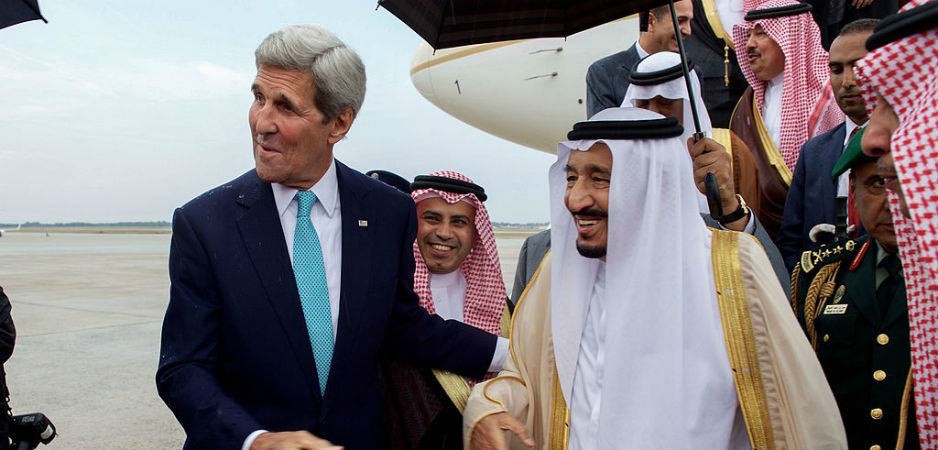With differing interests, the Saudi-led anti-terror coalition is unlikely to weaken the Islamic State.
On December 15, Saudi Arabia’s young and inexperienced defense minister announced a military coalition made up of nearly three dozen mainly Sunni Muslim states, stretching from Morocco to Bangladesh. The Saudi-led alliance’s stated purpose is to defeat global terrorism in five nations: Afghanistan, Egypt, Libya, Iraq and Syria.
Mohammad bin Salman’s announcement followed months of increased pressure from US officials on Arab Gulf nations to fight Daesh (“Islamic State”) more forcefully. However, given the conflicting interests and lack of military experience on the part of the coalition’s members, there is ample reason to conclude that this alliance lacks substance.
A “Coalition” of the Weak, Divided and Unwilling
The Saudi-led coalition includes Bahrain, Bangladesh, Benin, Chad, Comoros, Cote d’Ivoire, Djibouti, Egypt, Gabon, Guinea, Jordan, Kuwait, Lebanon, Libya, Malaysia, Maldives, Mali, Mauritania, Morocco, Niger, Nigeria, Pakistan, Palestine, Qatar, Senegal, Sierra Leone, Somalia, Sudan, Togo, Tunisia, Turkey, the United Arab Emirates and Yemen.
A number of these nations are failed states or just above that classification, beset by their own civil wars, Islamist insurgencies and endemic corruption. Several are among the world’s poorest countries.
For a variety of reasons, the announcement of this so-called coalition was bizarre and surprising. The leaders of Pakistan—one of Saudi Arabia’s most important allies—never officially agreed to join, and only learned of their purported membership from news organizations. Malaysian officials also expressed reservations and ruled out the possibility of Kuala Lumpur making any military contribution to the alliance.
Saudi Arabia and several other Gulf Arab states took part in the US-led campaign against Daesh in September 2014. However, the Gulf Cooperation Council (GCC) members’ contributions to the campaign were insignificant and came to an end after the Washington-led coalition’s initial missions were completed.
Like Saudi Arabia, the smaller GCC members, particularly the United Arab Emirates (UAE), have showed a deeper commitment to fighting the Houthi rebel movement in Yemen—viewed in Riyadh and Abu Dhabi as an extension of Iranian influence—than to combating Daesh in Iraq and Syria. It is unlikely that the GCC members’ priorities will change in light of Saudi Arabia’s announcement.
Split Interests
Among the Saudi allies with relatively powerful militaries—including Turkey, Egypt and the UAE—it is doubtful they will cease to pursue their own respective interests, which certainly conflict.
Ankara’s top priorities in Syria entail toppling the Assad regime and preventing the Syrian Kurds from establishing a proto-state governed by a Kurdistan Workers’ Party (PKK) affiliate group along Turkey’s southern border. Overwhelming evidence demonstrates that NATO member Turkey has actively supported Daesh’s sale of oil to the global markets in order to advance these two objectives.
As Russia has stepped up its direct military involvement in Syria to fight certain militias, which Saudi Arabia sponsors yet the Kremlin considers “terrorist” organizations, it is difficult to imagine how the Riyadh-led coalition would interact with Moscow given the conflicting interests among the member nations. Saudi allies in Abu Dhabi, Amman, Cairo and Manama welcome Russia’s intervention in Syria, sharing Moscow’s interest in preserving the Syrian nation-state and defeating Daesh. On the other hand, Ankara and Doha staunchly oppose Russia’s direct military intervention in Syria, as underscored by the Turkish military having shot down a Russian fighter jet in November. Such geopolitical divisions undermine the potential for Riyadh to unite the Sunni Muslim world against “terrorism.”
Moreover, the stated objectives and strategies of this coalition are vague. Aside from Daesh, which other “terrorist” groups in the five target countries will this pan-Sunni alliance combat? Where will the intelligence to combat them be derived? Which countries in this coalition will deploy most of the troops? How many soldiers will be required to be effective?
Although many of the coalition members have combated extremist groups unilaterally, the task of defining terrorism will be problematic if they are to effectively fight such organizations within the framework of a NATO-like alliance. Among the 34 states, there is ample disagreement as to which non-state actors are “terrorist” organizations.
Turkey, Sudan and Qatar support the Muslim Brotherhood across the Middle East and North Africa region. Yet Egypt and the UAE consider the Islamist movement to be a “terrorist” organization. Saudi Arabia and other members of this coalition consider Hezbollah and other Iranian-sponsored Shia militias in Syria and Iraq to be “terrorist” organizations. Given that these groups—along with the Syrian and Iranian militaries and Kurdish fighters—serve as the most effective forces against Daesh, will the Saudi-led military coalition combat both Hezbollah in addition to the Daesh fighters?
Counter Iran
Certainly, the objectives of the coalition are unclear and most likely highly unrealistic. All of these questions leave one wondering why Riyadh bothered to make the surprising announcement. The answer has to do with Iran, not Daesh.
Given that Saudi Arabia’s coalition deliberately omitted the “axis of resistance” (Iran, Iraq, Syria and Lebanon’s Hezbollah), Riyadh is determined to create a pan-Sunni alliance committed to countering Iranian influence in the Arab world. The declaration of this alliance underscores new geopolitical realities in the Middle East, in which Washington left the Saudi leadership with the impression that the US had abandoned much of its commitment to the kingdom’s security in favor of a rapprochement with Iran—Riyadh’s archrival. Saudi Arabia undoubtedly came to believe that it had little option to but to rely on itself and its perceived allies to establish a Sunni Muslim equivalent of NATO to provide a counterweight to Tehran.
The absence of a serious commitment on the GCC’s part to fight Daesh has been a source of frustration for many in Washington and other Western capitals. The Obama administration and members of the US Congress may issue statements expressing support for this anti-terrorism alliance led by Saudi Arabia. Yet both President Barack Obama and his successor will find Riyadh to be an awkward and highly problematic ally in the battle against groups such as Daesh. Given the history of the kingdom’s religious establishment promoting anti-Shia Islam and other forms of religion-inspired bigotry, there is little reason to wonder why Saudi Arabia has more of its own citizens fighting on behalf of Daesh than any other nation in the world aside from Tunisia.
Now that Daesh has set its sights on the kingdom and has expressed its commitment not only to ridding the Arabian Peninsula of Shia Muslims, but also to toppling the House of Saud, Riyadh faces an enemy largely of its own making. Despite Saudi Arabia’s proclaimed coalition against Daesh and other terrorist groups, the reality is that this disparate collection of nations is unlikely to weaken the “caliphate,” as its members are neither capable nor interested in doing so.
Indeed, if the Saudis were genuinely committed to weakening Daesh, officials in Riyadh would cease to finance religious schools worldwide that spread Wahhabism, Daesh’s ideological foundation. Without making such efforts aimed at addressing the root cause of jihadist terrorism in the broken Middle East, there is little reason to expect this coalition to effectively weaken the “Islamic State.”
*[Note: This article was updated on December 24, 2015.]
The views expressed in this article are the author’s own and do not necessarily reflect Fair Observer’s editorial policy.
Photo Credit: US State Department
 We bring you perspectives from around the world. Help us to inform and educate. Your donation is tax-deductible. Join over 400 people to become a donor or you could choose to be a sponsor.
We bring you perspectives from around the world. Help us to inform and educate. Your donation is tax-deductible. Join over 400 people to become a donor or you could choose to be a sponsor.
Support Fair Observer
We rely on your support for our independence, diversity and quality.
For more than 10 years, Fair Observer has been free, fair and independent. No billionaire owns us, no advertisers control us. We are a reader-supported nonprofit. Unlike many other publications, we keep our content free for readers regardless of where they live or whether they can afford to pay. We have no paywalls and no ads.
In the post-truth era of fake news, echo chambers and filter bubbles, we publish a plurality of perspectives from around the world. Anyone can publish with us, but everyone goes through a rigorous editorial process. So, you get fact-checked, well-reasoned content instead of noise.
We publish 2,500+ voices from 90+ countries. We also conduct education and training programs
on subjects ranging from digital media and journalism to writing and critical thinking. This
doesn’t come cheap. Servers, editors, trainers and web developers cost
money.
Please consider supporting us on a regular basis as a recurring donor or a
sustaining member.
Will you support FO’s journalism?
We rely on your support for our independence, diversity and quality.






